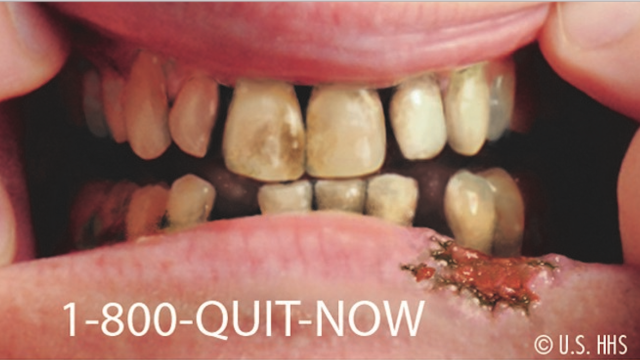Can you trust science based on teenage subjects? Let me ask you a different question: Can you trust teenagers not to prank scientists?
In a recent study, teenagers exposed to this poster may or may not have been tempted to buy cigarettes. Image: US HHS
A recent study, in which American teens shopped in a pretend convenience store, found that gruesome anti-smoking ads might actually encourage kids to buy cigarettes, since they make smoking seem more edgy. But don’t take this finding at face value yet, as some other outlets have, because history has shown that teenagers like to mess with scientists.
But first, the study. “The basic conclusion is that we’d urge caution in terms of displaying graphic warning posters, because they may actually have the opposite effect of what was intended,” said lead author William Shadel, associate director of the Population Health Program at the RAND corporation.
The researchers set out to study the effect of those graphic “smoking kills” posters on teens – after all, tobacco companies spend a whole lot of money on such advertising in the places where cigarettes are sold. Many US states have put those posters in convenience stores. In Australia, such graphics adorn cigarette packets and TV commercials. Whether they actually work as deterrents hasn’t been studied much, as the paper to be published in Nicotine & Tobacco Research says. The few existing studies are in adults and offer inconsistent results.
The researchers had 441 teens fill out a questionnaire with a few questions such as “Do you think you will try a cigarette soon?” to establish their smoking risk. Then they handed each kid $US10, told them to go shopping in a simulated store, and had them fill out another questionnaire.
None of the kids tried to buy any tobacco. However, the followup questionnaire suggested to the researchers that the kids who were seemingly “at risk” at the beginning of the study were even more at risk of smoking by the end.
Shadel told me that it was a tricky design for a laboratory study. “It’s an experimental study under tightly controlled conditions. Our convenience store nicely mimics a 7/11 or [petrol station], and we certainly had feedback from both kids and adults to say that it has ecological validity to it,” he said. “But it’s still an artificial scenario.”
Professor emeritus at Cornell University Ritch Savin-Williams, who was not involved in this study, found some issues with the design of the questionnaires. For example, is considering taking a single puff of a cigarette, ever, a smoking risk? Did the teens even notice the graphic poster?
Then there are, well, the teens. “I wonder if they’re really being honest, or if there aren’t some prankster type of kids in there,” he said. “It doesn’t take many when you have that small group like that to make a big difference in your findings.”
Historically, dishonest teens have definitely caused problems for scientists. Savin-Williams himself studied homosexuality in teenagers and noticed “jokesters” skewing research results in another study, reported by the LA Times in 2014. That article recounts one study where “hundreds of teens said they had an artificial hand, arm, leg or foot, yet few reported the same thing when interviewed at home”. As far back as the 1920s, one critic accused Margaret Mead of falling for a teenager’s lewd jokes while documenting Samoan sexual practices. (Every part of the account, from Mead’s own political agenda to whether she was actually gullible or if that accusation was based on her accuser’s political agenda, seems subject to controversy).
Maybe those gruesome posters really will increase a teen’s chances of smoking. Maybe all of the teens were being honest. Or maybe some of them weren’t taking it seriously because they were dragged to a lab by their parents for an afternoon. Who knows.
As for Shadel, he told me that ultimately, his team is trying to meet an FDA need to support regulatory actions with empirical data. “But this is just one study, and we shouldn’t base regulations on the findings of one study.”
